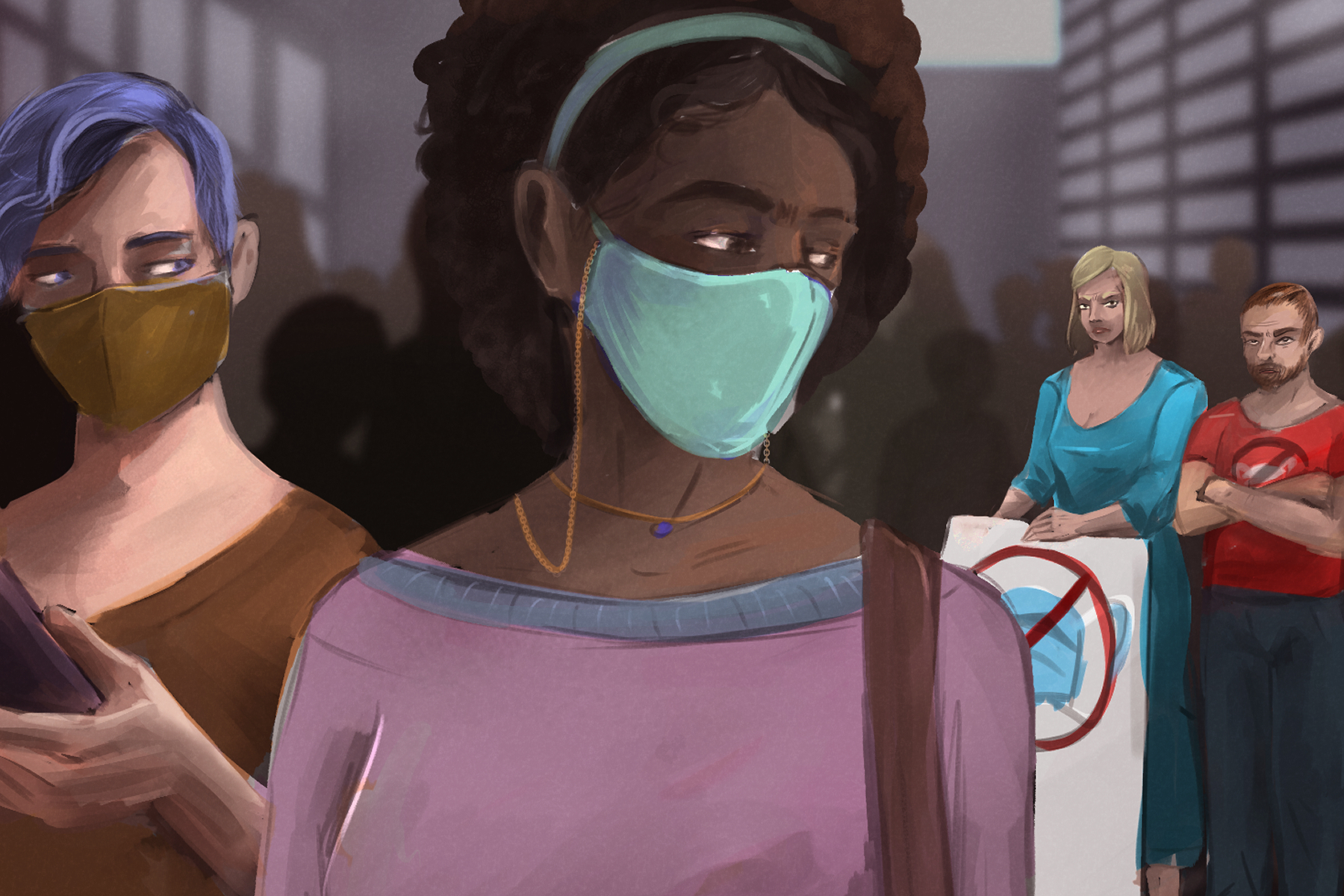In modern times, America seems to be immersed in the throes of a culture war. What is a culture war? Some examples are the Gamergate controversy, Critical Race Theory and cancel culture. In America, a culture war is typically marked by squabbling on Twitter and cable news television shows, but a lack of interest from people with actual problems or responsibilities. However, COVID-19 is a unique beast; it is not just an idea, but an actual threat to many. COVID-19 has become one of the most prevalent and deadly culture wars in the United States of America, thanks to Donald J. Trump and the backlash he inspires.
Some would liken former president Donald Trump to a bull in a china shop, but I would argue that he is simultaneously the bull and the china. He’s the destroyer and the destroyed. In his reign as president, Trump stoked the flames of partisanship — prejudice in favor of a particular cause — in a way that turned everything political, effectively destroying any opportunity for bipartisanship the moment he dichotomized “red states” and “blue states.”
Trump’s handling of the coronavirus pandemic destroyed the country, taking the lives of over 600,000 Americans and prompting lockdowns across the nation. Trump’s response also destroyed himself, however, as he seemingly ruined his political future with the Jan. 6 Capitol riot and his subsequent ban from social media. He politicized everything about the pandemic, including the existence of the pandemic itself and the efficacy of masks.
The conversation around masks in America started with a lie from Dr. Anthony Fauci, an infectious disease expert who rose to fame during the AIDS crisis. After the rush to stock up on toilet paper, he advised Americans not to wear masks in an attempt to save a weakened supply of medical-grade masks for health care workers.
Although this is not a bad reason to advise against masks, this misstep on Fauci’s part at such a crucial time soured millions of Americans on masks — people further soured by Trump’s refusal to wear them and dogging others for the same. Notably, former President Trump mocked President Joe Biden during a debate for his mask-wearing, proclaiming that Biden consistently wore the “biggest mask I had ever seen.” This arc of Trump’s presidency was punctuated beautifully when Trump tested positive for COVID-19 a few days after this debate, the “Curb Your Enthusiasm” theme spiritually blasting over the nation as people took to social media to swap jokes and send negativity Trump’s way.
However, there’s blame on both sides; becoming a science zealot and worshipping Fauci can be as harmful as denying the virus exists when the goal is national unity. The Fauci worship as a response to the “MAGA cult” exemplifies America’s tendency to gravitate toward a “strong man,” someone who has all the answers in times of confusion.
On the left of the political spectrum, Trump’s blatant negligence and lackluster response to the COVID-19 pandemic inspired a countermovement involving yard signs and T-shirts declaring “science is real.” Like “Defund the Police,” “Believe in Science” (or “Trust the Science”) has become another largely meaningless phrase that became plastered on paraphernalia and is meant to virtue signal. The left/liberal response to the politicization of the pandemic demonstrates that America is a nation of performance from both sides: The MAGA hats and the lack of mask-wearing on the right complement the “Trust the Science” shirts and triple masking on the left.
Science is fluid. In the scientific field, ideas and theories are altered and disproven at the drop of a hat. At one point in history, people believed that the sun revolved around the Earth and that was “science,” and people changed their minds when more evidence came disproving that theory. But now it seems people are digging their heels into “trusting the science,” refusing to budge on the masks, either due to genuine trauma or the desire to feel superior.
On May 13, the Center for Disease Control, or the CDC, advised that fully vaccinated people were no longer required to wear a mask or socially distance. One would expect an outpouring of joy from the masses eager to throw out the masks and get back to normal, but the responses to the CDC’s tweet looked quite different. Instead of excitement, the tweet sparked hesitation and disagreement, some arguing that the announcement seemed rushed and that they were going to keep wearing masks — the same people who claim to believe in science. People continuing to wear masks is totally fine and their own personal choice, but what happened to trusting the science? Or should you only believe in science when it confirms your own narratives? Masks are good, but vaccination/immunity is even better.
In many ways, the mask has become more of a symbol in America than an actual medical tool. When you tie politics to public health, the results are disastrous. Cloth masks can be interpreted as our government failing to protect us during a time of crisis, with a low supply of N95s and a market barren of protective masks leading people to patronize Etsy stores or buy their masks from overseas. Much like Trump, the mask is inflammatory and invokes passionate emotions from both sides of the aisle (and a resigned shrug from those in the middle), one side masking in response to the other side not masking, both as acts of defiance.
The idea of masking as a performance and a show of political solidarity trumps any medical benefit for some — a popular reason given on Twitter for the fully vaccinated to wear masks has been to “not be seen as a Trump supporter,” paraphrased of course. Doesn’t that speak to how the aftermath of the 2016 election fried the brains of some people, leading everything to become a matter of sticking it to the “bad orange man”? Granted, Trump undoubtedly deserves critique and scorn for his handling of the pandemic, but Trump won’t see you wearing your mask. He won’t see you social distancing or not hugging people. At the end of the day, what you do should be for yourself and the health of your family, not to spite someone who doesn’t even know you.
The handling of the COVID-19 pandemic has shown that partisanship can kill. Another unfortunate byproduct of the pandemic has been a resurgence of culture wars; with people stuck inside their homes with free time and internet access, it was only natural that fake outrage would be generated. But the mask is a different story, as your choice to wear a mask now communicates your political standing. This is how the mask situation has gotten so out of hand: When you tie something to politics, the results are never pretty.
How can public health officials ensure that America never becomes so divided? Messaging needs to be sympathetic, non-political and honest; the shiftiness and political calculation of government officials during this pandemic turned countless Americans off from following official public health guidelines.
Will America ever get past the culture wars? Like masks, culture wars can be symbolic; if a politician has nothing to offer their constituents in terms of actual policy that would meaningfully change their lives, they rely on the culture war.

















